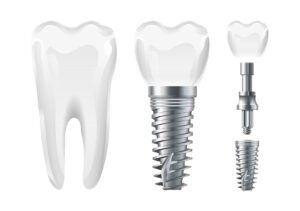
25 Oct Can Dental Implants Last a Lifetime?
In the face of tooth loss, many have found hope in dental implants. But can they truly stand the test of time? While there are differing opinions on the lifespan of dental implants, many studies have shown that with proper care and maintenance, they can last for 25 years or more. There are several factors that can greatly impact the longevity of dental implants. However, it is important to regularly visit your dentist and practise good oral hygiene habits to help ensure the success of your dental implant for as long as possible.
How Dental Implants Work
Dental implants are a remarkable advancement in modern dentistry, offering a long-lasting solution for tooth replacement. Unlike traditional dentures or bridges that sit on the gums or rely on adjacent teeth for support, dental implants are surgically inserted into the jawbone to mimic the function of a natural tooth root. This provides a sturdy foundation for single-tooth replacement or as an anchor for bridges and dentures.
Imagine having a missing tooth that affects your confidence and ability to chew properly. Dental implants offer a lifelike solution that not only restores the appearance of your smile but also improves your overall oral health and functionality.
The process of getting a dental implant involves several stages. First, a titanium post is surgically placed into the jawbone, which acts as the implant root. This post undergoes a natural process called osseointegration, where it fuses with the bone over time. This integration creates a stable and durable foundation for the prosthetic tooth.
Once the integration is complete, an abutment is attached to the implant root, serving as a connector between the implant and the crown (the visible part of the tooth). The crown is custom-made to match the shape, colour, and size of your natural teeth and is securely placed onto the abutment.
Components and Function of Implants
A dental implant consists of three main components: the implant root (titanium post), the abutment, and the crown. Each component plays a crucial role in restoring both the appearance and functionality of a missing tooth.

The implant root is made of biocompatible titanium, which allows it to fuse with the surrounding bone during osseointegration. This process provides stability and prevents bone loss that often occurs with missing teeth. The implanted root acts as an anchor for the prosthetic tooth, ensuring it remains securely in place while withstanding chewing forces.
Attached to the implant root is the abutment, which serves as a connection between the implant and the crown. The abutment is usually made of either titanium or ceramic material. It provides support and stability for the crown, allowing for natural-looking aesthetics and proper function when biting and chewing.
The crown is the visible part of the dental implant that closely resembles a natural tooth in shape, colour, and size. It is custom-made to match your existing teeth, ensuring a seamless integration within your smile. The crown is typically made from materials like ceramic or porcelain, chosen for their durability and ability to mimic the translucency of natural teeth.
While dental implant roots can last for many years, it’s important to note that crowns may need replacement after approximately 10-15 years due to wear and tear. Factors such as chewing habits, teeth grinding, and oral hygiene practices can influence the lifespan of the crown.
Potential Lifespan of Dental Implants
Numerous studies have been conducted to assess the longevity of dental implants, and research insights provide valuable information. For instance, studies show a survival rate of 93% for dental implants at the 17-year mark and 94% at 15 years. In fact, dental implants often outlive patients themselves, with a staggering survival rate of over 99% after two decades.
However, it’s worth noting that the restoration part of dental implants, such as crowns or dentures, may not last as long as the implant itself. Research indicates a 98% survival rate for implant-supported dental crowns during the first five years and a 90% survival rate at ten years. A comprehensive thirty-year study found that dental crowns on implants had an impressive 80% survival rate.
To extend the life of dental implants and their restorations further, it is vital to follow good oral hygiene practises, quit damaging habits like smoking or teeth grinding, choose high-quality implants and restorations, and select an experienced implant dentist who can ensure proper placement and ongoing maintenance.
4 Factors That Affect Implant Longevity
The following 4 factors can significantly impact the longevity of dental implants.
Oral Hygiene Practises: Proper oral hygiene plays a vital role in ensuring the long-term success of dental implants. Regular brushing and flossing, along with routine professional cleanings and check-ups, help prevent gum disease and maintain healthy oral tissues around the implant. Neglecting oral hygiene can lead to peri-implantitis—a condition similar to gum disease—which can compromise the stability and lifespan of the implant.
Overall Health: General health conditions, such as diabetes or autoimmune disorders, can affect the healing process and the long-term success of implants. It is essential to disclose any underlying health conditions to your dentist to ensure appropriate treatment planning and follow-up care.
Implant Quality and Restoration: The overall quality of the implant system and the restoration attached to it play a significant role in implant longevity. Using reputable brands and high-quality materials can enhance the durability and effectiveness of dental implants. Additionally, the design and fit of the restoration must be precise to reduce mechanical stress on the implant and surrounding structures.
The skill of the Dentist: The expertise and skill of the dentist performing the implant procedure are crucial determinants of long-term success. A dentist with the correct training and experience in implant dentistry can ensure proper placement, accurate diagnosis, and effective treatment planning tailored to your specific needs.
Maintaining Your Dental Implants
Like natural teeth, dental implants require regular brushing and flossing. Use a soft-bristle toothbrush and non-abrasive toothpaste to brush your implants gently twice a day. Pay special attention to the gumline where the implant meets the gum tissue, as plaque can accumulate there. Flossing is equally important, as it helps remove any food particles or plaque that might have accumulated between the teeth and implants.
Regular dental check-ups are crucial when it comes to maintaining the longevity of your dental implants. Your dentist will be able to assess the health of your implants, identify any potential issues early on, and provide professional cleaning. These routine visits also offer an opportunity for your dentist to evaluate the condition of surrounding teeth and tissues, ensuring that everything remains in optimal shape.
Another important aspect of maintaining your dental implants is avoiding detrimental habits such as smoking or using tobacco products. Tobacco can significantly impair the healing process after implant placement and increase the risk of implant failure. Therefore, if you are a smoker, it is advised to quit to ensure the long-term success of your implants.
Furthermore, be mindful of what you eat. While dental implants can withstand normal biting and chewing forces, excessive pressure from hard or sticky foods can potentially damage them. Try to avoid biting down on hard objects like ice or using your teeth as tools, as these actions can compromise the integrity of your implants.
Can dental implants be replaced if they fail over time?
Dental implants can be replaced if they fail over time. While dental implants are designed to be a long-term solution for missing teeth, they can occasionally fail due to factors like infection, trauma, or poor oral hygiene. However, the success rate of dental implant replacements is high. Replacing failed dental implants can restore oral function and aesthetics, offering patients a second chance at a confident smile.


